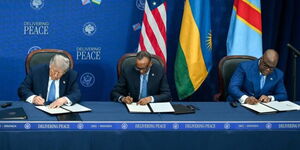The Parliamentary Budget Office has warned that the targetted audience for the affordable housing project might miss out on the program, after a thorough financial and economic analysis of the bill.
According to a report published on January 10, the office raised seven concerns regarding the Affordable Housing Bill, of 2023. The report emphasized the importance of addressing these concerns to provide clarity for citizens.
Issues of Concern
Equity in benefit sharing; Not for the Poor
The office questioned the logic behind the allocation percentages for the money contributed towards the housing fund, as low-income earners registering bigger numbers only receive 60 per cent of the total contributions.
In the bill, 30 per cent of the money is allocated to the Social Housing Projects which mainly target persons with a monthly income of below Ksh20,000, 30 per cent to Affordable Housing projects with an income of between Ksh20,000 and Ksh149,000, and the rest 36 per cent to Institutional Housing Programme and Projects which mainly targets persons with a monthly income above Ksh149,000.
Lack of alignment with the PFM Act, 2012 concerning accruals to the fund
The bill needs to address how money accrued at the end of the financial year is to be handled.
According to the PFM Act, 2012, any national public fund administrator should ensure funds accrued are retained in the program unless instructed otherwise by the Cabinet Secretary.
Clarity on how the funds will be utilised under the Kenya Slum Upgrading, Low-Cost Housing and Infrastructure Fund (KENSUF)
The analysis questions the bill's framework for the utilization of 30 per cent of the affordable housing funds designated for slum upgrading under the Kenya Slum Upgrading, Low-Cost Housing and Infrastructure Fund (KENSUF). It argues for the necessity of outlining procedures for negotiations with county governments regarding this matter.
Clarity on the definition of Institutional Housing Programmes and Projects
The parliamentary office recommended that the bill define Institutional Housing Programmes, taking into account existing initiatives such as the Civil Servants Housing Mortgage Fund, which provides benefits of a similar nature to public servants.
Need to include proof of contribution of the Levy as part of the eligibility criteria for application for an affordable unit
The housing bill does not include proof of up-to-date contribution to the Affordable Housing Levy as one of the requirements which is essential since the monies to be accessed are from contributions of Kenyans to the levy.
Gaps and overlaps in the classification of affordable housing units
The office highlighted a gap in the categories of houses outlined in the Bill, for units with an average plinth area of between 30 to 36 square meters. The units therefore do not fall in either Social Housing (plinth area of 18 to 30 square meters) or Affordable Housing (plinth area of 36 to 80 square meters).
Implication of the nullification of the Affordable Housing Levy to On-Going Social and Affordable Housing Projects
In light of the current court proceedings on the status of the Housing Levy, the government will be exposed to fiduciary risks due to the contractual obligations it has already entered with property developers for the ongoing projects since the government Exchequer funding is constrained.
The Parliamentary Budget Office disclosed that the State Department for Housing and Urban Development collected Ksh26.8 billion under the Housing Levy amid legal hitches.












